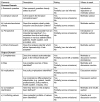Q-SEA - a tool for quality assessment of ethics analyses conducted as part of health technology assessments
- PMID: 28326147
- PMCID: PMC5352988
- DOI: 10.3205/hta000128
Q-SEA - a tool for quality assessment of ethics analyses conducted as part of health technology assessments
Abstract
Introduction: Assessment of ethics issues is an important part of health technology assessments (HTA). However, in terms of existence of quality assessment tools, ethics for HTA is methodologically underdeveloped in comparison to other areas of HTA, such as clinical or cost effectiveness. Objective: To methodologically advance ethics for HTA by: (1) proposing and elaborating Q-SEA, the first instrument for quality assessment of ethics analyses, and (2) applying Q-SEA to a sample systematic review of ethics for HTA, in order to illustrate and facilitate its use. Methods: To develop a list of items for the Q-SEA instrument, we systematically reviewed the literature on methodology in ethics for HTA, reviewed HTA organizations' websites, and solicited views from 32 experts in the field of ethics for HTA at two 2-day workshops. We subsequently refined Q-SEA through its application to an ethics analysis conducted for HTA. Results: Q-SEA instrument consists of two domains - the process domain and the output domain. The process domain consists of 5 elements: research question, literature search, inclusion/exclusion criteria, perspective, and ethics framework. The output domain consists of 5 elements: completeness, bias, implications, conceptual clarification, and conflicting values. Conclusion: Q-SEA is the first instrument for quality assessment of ethics analyses in HTA. Further refinements to the instrument to enhance its usability continue.
Keywords: ethics analysis; health technology assessment; methodology; quality assessment; systematic reviews.
Conflict of interest statement
BH has a potential conflict of interest as author of the Socratic approach that was used as an ethics framework in the Droste et al.’s systematic review, but did not participate in the application of the Socratic approach by Droste et al. Others report no conflicts of interest.
Figures
References
-
- Health technology assessment. Int J Technol Assess Health Care. 2009 Jul;25 Suppl 1:10. doi: 10.1017/S0266462309090345. Available from: http://dx.doi.org/10.1017/S0266462309090345. - DOI - PubMed
-
- Australian Government. Review of Health Technology Assessment in Australia. December 2009. Commonwealth of Australia; 2009. Available from: http://www.health.gov.au/internet/main/publishing.nsf/Content/hta-review....
-
- HTAglossary.net. Health Technology Assessment. [5 September 2016]. Available from: http://htaglossary.net/health+technology+assessment+%28HTA%29.
-
- Autti-Rämö I, Mäkelä M. Ethical evaluation in health technology assessment reports: an eclectic approach. Int J Technol Assess Health Care. 2007;23(1):1–8. doi: 10.1017/S0266462307051501. Available from: http://dx.doi.org/10.1017/S0266462307051501. - DOI - PubMed
-
- Gutiérrez-Ibarluzea I, Ibargoyen-Roteta N, Galnares-Cordero L, Benguria-Arrate G. Ethical perspectives' use in HTA and Early Awareness and Alert Systems (EAAS). 8th annual meeting. HTA for Health System Sustainability; June 25th - 29th, 2011; Rio de Janeiro. p. 227. Available from: http://www.htai.org/fileadmin/HTAi_Files/Conferences/2011/Book_abstracts....
LinkOut - more resources
Full Text Sources
Molecular Biology Databases


